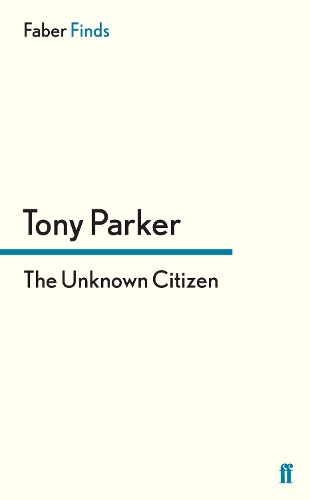
The Unknown Citizen
(Paperback, Main)
Publishing Details
The Unknown Citizen
By (Author) Tony Parker
Faber & Faber
Faber & Faber
18th July 2013
Main
United Kingdom
Classifications
Tertiary Education
Non Fiction
Criminal or forensic psychology
Biography: philosophy and social sciences
364.373092
Physical Properties
Paperback
172
Width 111mm, Height 178mm, Spine 12mm
154g
Description
'Charlie Smith is only one of many similar men who are at this moment living unhappily among us, or are confined in prison now but must sooner or later be released.'The Unknown Citizen (1963) was Tony Parker's second study of a criminal recidivist.'Mr Parker's very moving book tells what happened the day Charlie left prison and in his first year of freedom. Charlie himself contributes a pitiful attempt at a self-portrait. We have the author's conversations with the magistrate who sentenced him, with his sorely tried elder sister and with others who have come into his life in the last 18 months... The final chapter is masterly... This is literature, not just another book on crime.' D.L. Howard, Telegraph
Author Bio
Tony Parker was born in Stockport on June 25 1923, the son of a bookseller. His mother died when he was 4. He began to write poems and plays in his late teens. Called up to military service early in the Second World War he declared himself a conscientious objector and, in lieu, was sent to work at a coal-mine in the North East, where he observed conditions and met people who influenced him hugely. After the war he began to work as a publisher's representative and, voluntarily, as a prison visitor - the latter another important stimulus to his subsequent writings. After Parker happened to make the acquaintance of a BBC radio producer and imparted his growing interest in the lives, opinions and self-perceptions of the prisoners he had met, he was given the opportunity to record an interview with a particular convict for broadcast on the BBC. The text of the interview was printed in the Listener, and spotted by the publishers Hutchinson as promising material for a book. This duly emerged as The Courage of His Convictions (1962), for which Parker and the career criminal 'Robert Allerton' (a pseudonym) were jointly credited as authors. Over the next 30 years Parker would publish 18 discrete works, most of them 'oral histories' based on discreetly edited but essentially verbatim interview transcripts. He died in 1996 (though one further work, a study of his great American counterpart Studs Terkel, appeared posthumously.)
